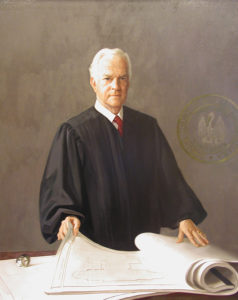Pascal F. Calogero Jr.
Pascal F. Calogero, Jr. served as Chief Justice of the Louisiana Supreme Court from 1990 to 2008.

Courtesy of The Law Library of Louisiana
Pascal F. Calogero, Jr. Ozols, Auseklis (Artist)
Pascal Frank Calogero Jr. was the twentieth chief justice of the Louisiana Supreme Court, serving in that capacity from April 9, 1990, to December 31, 2008. Upon his retirement, he was the longest-serving justice on the high court to date, having been on the bench since 1973, when he won a seat as an associate justice. Under his guidance, major improvements in the court system were instituted, and many of them have become models for other courts around the nation. He oversaw the creation of the Louisiana Indigent Defender Board, improvements to the juvenile court system, development of a new lawyer disciplinary code, the strengthening of the judicial disciplinary system, the adoption of strategic plans for the three-tiered court system, implementation of a uniform pay plan for the state appellate courts, and establishment of the Supreme Court’s community relations department. Such accomplishments took place amid the regular duties of participating in oral arguments, authoring opinions, and maintaining a current docket in the face of escalating court filings.
Calogero was born in New Orleans on November 9, 1931, to Pascal F. Calogero and Louise Moore Calogero. His father was a New Orleans police officer with a limited education who valued learning and encouraged his son to pursue a career in law. Calogero received his early education at C. J. Colton Grammar School and graduated from St. Aloysius High School in 1949. He learned to work hard at an early age, holding a variety of jobs while attending high school, playing baseball on the championship team at St. Aloysius, and excelling academically. After a course of pre-legal studies at Loyola University, Calogero earned his juris doctorate from Loyola Law School in 1954. He was president of the Loyola Law Review’s student editorial board and ranked first in his class. In 1992, he received a master of laws degree in judicial process from the University of Virginia.
Calogero served in the U.S. Army from 1954 to 1957; he was commissioned as a second lieutenant in the military police and then as a captain in the Judge Advocate General’s Corps. After his discharge, he worked as a law clerk for the judges of the Orleans Parish Civil District Court before forming in 1958 a law partnership with his close friends, Moon Landrieu (a future mayor of New Orleans) and Charles Kronlage Jr. Calogero had expressed an interest in becoming a judge, and in 1972 he decided to run for the Supreme Court seat vacated by Chief Justice Howard McCaleb’s retirement. Calogero won election over three other candidates in a hard-fought campaign and was sworn in as an associate justice of the Supreme Court on January 10, 1973, for a two-year unexpired term. In 1974, he won reelection to a fourteen-year term, emphasizing in his campaign the need to reform the administration of justice. He was subsequently reelected to ten-year terms in 1988 and 1998. On April 9, 1990, Calogero was sworn in as chief justice, the second Loyola University Law School graduate and first Italian American to hold that office in Louisiana.
Calogero’s most visible achievement is the renovation of the New Orleans Civil Court Building at Royal and Conti Streets in the French Quarter. Built in 1908 for the Supreme Court and many smaller courts and state offices, the Royal Street courthouse had been vacated by the state courts in 1958. The building suffered serious neglect and was in danger of being torn down or altered significantly for other purposes. In the 1980s, the Supreme Court began to explore the possibility of returning to its 1908 building, and throughout the 1990s Calogero fought hard to win over the legislature to the idea and to acquire state funding for the project. The renovation was completed in 2004, and the Supreme Court and its associated agencies moved back into their former home. The impressive building now lends its dignity to the proceedings of the court and its vitality to the French Quarter.
Many honors have been bestowed on Calogero. He received the Louisiana Bar Foundation’s Distinguished Jurist Award in 1991, and that same year he was awarded an honorary doctor of laws degree from Loyola School of Law. He has been recognized nationally for his work on indigent defense and judicial education, and in Louisiana he received the Justice Albert Tate Jr. Award from the Louisiana Association of Criminal Defense Lawyers in 1997 and the Outstanding Judicial Award from Victims and Citizens Against Crime in 1999. The Loyola Law School Alumni Association honored him in 2001 for his distinguished career. In 2005 Calogero received the Beacon of Justice Award from the American Board of Trial Advocates’ Southeast Chapter, and he was inducted into the Louisiana Justice Hall of Fame by the Louisiana State Penitentiary Museum Foundation at Angola.
When Pascal Calogero was inducted into the office of chief justice of Louisiana in 1990, one of his fellow jurists, Associate Justice James L. Dennis, spoke for the court. After a lengthy list of the duties of the position, Dennis summed up Calogero’s perception of the role of chief justice by saying, “I know that his vision is not narrow; that he wants this Court to be all that it can be and that he will work tirelessly to that end.”
Calogero is married to Leslie Langhetee and is the father of ten children.
